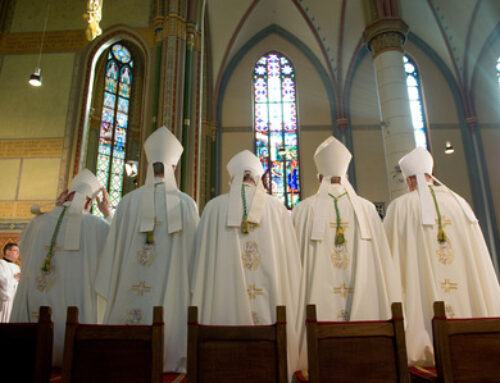
Protestants believe that faith in Christ is alone sufficient for salvation. Catholics believe that faith must be joined by good works. For four centuries the difference has not been resolved. Theological purists on both sides may think it cannot be. Many other Christians, however, believe that it can. They also believe that the credibility of Christian witness to non-believers depends on that resolution.
A helpful beginning is to acknowledge how much Protestants and Catholics have in common. Most notably, they agree that the disposition to act in ways harmful to self and others (in a word, sinfully) is part of human nature and that all people need deliverance from that disposition and its consequences. They also believe that by His suffering and death Jesus Christ provided that deliverance—that is, He brought salvation.
Another important step is to acknowledge that both sides claim scriptural support for their positions. This admission helps to overcome the unfortunate habit of pretending that Scripture supports only one’s own view and that anyone who holds the other view must be ignorant or ungodly. (See my essay on triumphalism.)
Here are some notable biblical passages linking salvation to faith.
. . . If you confess with your mouth Jesus as Lord, and believe in your heart that God raised Him from the dead, you will be saved; for with the heart a person believes, resulting in righteousness, and with the mouth he confesses, resulting in salvation. (Rom. 10:9-10)
For what does the Scripture say? “Abraham believed God, and it was credited to him as righteousness.” (Rom. 4:3)
For we maintain that a man is justified by faith apart from works of the Law. Or is God the God of Jews only? Is He not the God of Gentiles also? Yes, of Gentiles also . . . (Rom. 3:28-30)
. . . So that I may gain Christ, and may be found in Him, not having a righteousness of my own derived from the Law, but that which is through faith in Christ, by the righteousness which comes from God on the basis of faith. (Phil. 3: 8,9)
The phrase “works of the Law” in the last two quotations is often cited in Protestant writings as referring to good works in general. Yet many biblical scholars note that this is a mistake. The phrase refers only to works prescribed by Mosaic law, which are not the same as the more general term “good works.”
Here are some notable biblical passages linking salvation to works:
One who is gracious to a poor man lends to the Lord, And He will repay him for his good deed. (Prov. 19:17)
Then the King will say to those on His right, ‘Come, you who are blessed of My Father, inherit the kingdom prepared for you from the foundation of the world. ‘For I was hungry, and you gave Me something to eat; I was thirsty, and you gave Me something to drink; I was a stranger, and you invited Me in . . . “Then the righteous will answer Him, ‘Lord, when did we . . . “The King will answer, . . . ‘Truly I say to you, to the extent that you did it to one of these brothers of Mine, even the least of them, you did it to Me.’ (Matt. 25:34-40)
But when you give alms, do not let your left hand know what your right hand is doing that your alms may be in secret; and your Father who sees in secret will repay you . . . (Matt. 6:3,4)
“Not everyone who says to Me, ‘Lord, Lord,’ will enter the kingdom of heaven, but he who does the will of My Father who is in heaven will enter. (Matt. 7:21)
For the Son of Man is going to come in the glory of His Father with His angels, and will then repay every man according to his deeds. (Matt. 16:27)
But when you host a banquet, invite the poor, the crippled, the lame, and the blind, and you will be blessed. Since they cannot repay you, you will be repaid at the resurrection of the righteous (Luke 14:13,14).
Now he who plants and he who waters are one; but each will receive his own reward according to his own labor. (1 Cor. 3:8)
Now this I say, he who sows sparingly will also reap sparingly, and he who sows bountifully will also reap bountifully. (2 Cor. 9:6)
. . . The day of wrath and revelation of the righteous judgment of God, who will render to each person according to his deeds: to those who by perseverance in doing good seek for glory and honor and immortality, eternal life; but to those who are selfishly ambitious and do not obey the truth, but obey unrighteousness, wrath and indignation. (Rom. 2:5-8)
You see that a man is justified by works and not by faith alone. (James 2:24)
Behold, I am coming quickly, and My reward is with Me, to render to every man according to what he has done. (Rev. 22:12)
Many have said that the only way to resolve the theological controversy of faith versus works is to accept one and reject the other. That would be true if it were said anywhere in Scripture that salvation is through faith alone or works alone. However, no such statements can be found in Scripture. (The sole use of “faith alone” is St. James’ rejection of the idea in 2:4).
The phrase “faith alone” was created by Martin Luther, more than a millennium after the New Testament was completed, to express what he regarded as the implication of St. Paul’s statements about faith. (Luther rejected St. James’ epistle as an “Epistle of straw.”)
So if the argument from faith and that from works are not mutually exclusive but compatible, how can their compatibility be expressed? Or, to put it differently, what explanation of salvation would be consistent with Scripture and respectful of both Catholic and Protestant theological traditions? It would be presumptuous to attempt to construct a full answer in the space available here. Nevertheless, it is possible to specify some key truths that should be acknowledged and some key questions that should be addressed in forming the larger explanation of salvation:
Key Truths
Scripture makes clear that those who have faith in Jesus will be saved (Rom. 10:9-10), but only when their faith goes beyond verbal expression to include deeds (Matt 7:21; James 2:24) and is cloaked, not in pride, but in humility (Luke 18:11-14), because it is through God’s grace rather than our own unaided efforts that we do good things (Rom 2: 5-8).
God will reward people according to their deeds, especially deeds performed for the poor and needy (Matt. 16:27 and 25: 34-40). This payment will be made “at the resurrection of the righteous.” (Luke 14:13,14).
The reward for good deeds performed with noble intentions will be “eternal life” (Rom 2: 5-8). And the more “bountiful” the deeds, the greater that reward will be (2 Cor. 9:6).
Key Questions
Does the Holy Spirit make grace available only to Christians, or to all people, even agnostics or atheists, by virtue of their being created in the image and likeness of God? If the latter, then Christians should overcome their inclination to triumphalism and condescension.
Christians agree that faith can inspire good works and that good works can strengthen one’s faith. But is the corollary also true—that good works can inspire faith? If so, this could explain why some people find Christian faith only after lives of service prompted by other-than-Christian influences—for example Judaism, Buddhism, or even Ethical Humanism?
Affirming the key truths and pondering the key questions will enable Christians to see that parochial bickering about faith and works is not only unhelpful to Christian dialogue—it is also makes Christian witness to non-Christians less credible. That insight will enable Protestants and Catholics to cooperate in exposing the fallacies that continue to undermine western culture.
Copyright © 2016 by Vincent Ryan Ruggiero. All rights reserved.



